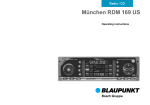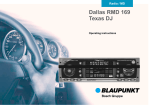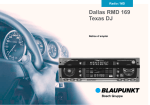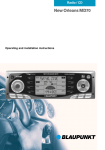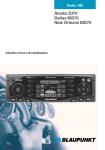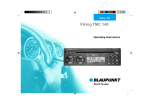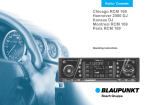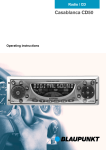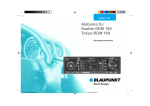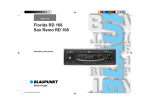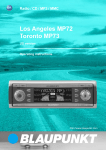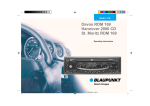Download Blaupunkt Dallas RMD 169 Operating instructions
Transcript
Radio / MD Dallas RMD 169 US Operating instructions 2 1 13 3 12 4 5 10 11 9 8 7 6 19 15 18 2 14 1 3 2 17 16 21 20 Selecting the operating mode .... 15 Enhancing display legibility ....... 15 Radio operation with RDS ........... 16 Activating/deactivating RDS ................. 16 AF - alternative frequency .................... 16 MiniDisc mode/ CD changer mode ........................ 22 Inserting a MiniDisc .............................. 22 Removing the MiniDisc ......................... 22 Activating MiniDisc mode ..................... 22 MD text .................................................. 22 Activating/deactivating MD text ............ 22 Displaying the MD text.......................... 22 Activating CD changer mode ................ 23 Selecting the display type ..................... 23 DEUTSCH ENGLISH FRANÇAIS Setting the time ..................................... 26 Displaying the time ............................... 26 Correcting the time following an interruption to the power supply ........... 26 Deactivating hours adjustment ............. 26 Equalizer setting .......................... 27 Adjustment instructions ........................ 27 Adjusting the frequency level ............ 27 Selecting a quality factor for the bass or mid-range ............................. 28 Selecting the preset sound setting: ...... 28 Tips on adjusting the equalizer ......... 29 Programming with DSC ............... 30 Overview of the factory default settings with DSC ............................................... 32 Technical data .............................. 32 Glossary of technical terms ....... 33 Installation and connection instructions ............ 138 3 NEDERLANDS Switching on the unit ............................ 13 Removing the KeyCard ........................ 13 Teaching in a second KeyCard/ replacing a KeyCard ............................. 13 Displaying the radio passport data ....... 14 Visual display for anti-theft protection .............................................. 14 Care of the KeyCard ............................. 14 KeyCard lost/damaged ......................... 14 Teaching in the new KeyCard .............. 14 Input errors ........................................ 14 Clock - Time .................................. 26 SVENSKA KeyCard anti-theft protection system ........................................... 13 Selecting tracks and CDs ..................... 23 Repeating tracks and CDs ................... 23 TPM (Track Program Memory) ............. 24 MIX ........................................................ 24 SCAN .................................................... 25 Assigning a name to CDs ..................... 25 Deleting the CD name/TPM store using DSC-UPDATE ...................................... 25 ESPAÑOL Read the following before using the unit .................................................. 12 Traffic safety ......................................... 12 Installation ............................................. 12 Telephone mute .................................... 12 Accessories .......................................... 12 Guarantee ............................................. 12 International hotline .............................. 12 Selecting the frequency band ............... 16 Station tuning ........................................ 17 Paging through the transmission chains (FM only) ............................................... 17 Changing the memory level (FM) ......... 17 Storing stations ..................................... 17 Automatically saving the strongest station with Travelstore ........................ 18 Calling up stored stations ..................... 18 Sampling stored stations with Preset Scan .......................................... 18 Sampling stations with Radio Scan ...... 19 Changing the sampling time (Scan) ..... 19 Changing the sensitivity of the seek run ................................................ 19 Toggling between stereo and mono (FM) ...................................................... 19 Automatic bandwidth switching (SHARX) ............................................... 19 PTY – Program Type ............................ 20 Program type ........................................ 20 PORTUGUÊS Condensed instructions ................ 4 Remote control RC 08 ................. 11 Important ...................................... 12 ITALIANO Contents Condensed instructions 2 1 Disengaging the fold-down control panel Disengage the control panel to insert or remove the KeyCard and CD. To disengage the control panel, press knob 1: the control panel folds down. The control panel cannot be removed, nor should it be used a shelf. To re-engage the control panel, push it back into its original position (Arrow 3). 1 3 For safety reasons, the control panel must always be engaged whilst the vehicle is moving. When leaving the vehicle, open the control panel and remove the KeyCard in order to prevent theft. 4 2 ON Switching on the unit Insert the KeyCard and press ON briefly. The unit is switched on in the last operating mode selected and with the previously selected volume. Switching off the unit Press ON for approx. 1 second. The display can be adjusted for the desired viewing angle in order to improve legibility. Refer to “Improving the legibility of the display” if necessary. Switching the sound on/off Press ON briefly. “MUTE” appears on the display when the sound is switched off. To switch the sound back on again, turn the volume knob 3. Switching the unit on/off using the KeyCard Insert/remove the KeyCard to switch the unit on and off. Refer also to the description of the KeyCard anti-theft system @ in the condensed instructions. Switching on/off by the ignition The unit may be connected up such that it is switched on and off by the vehicle ignition. When the ignition is switched off, a double beep reminds you to remove the KeyCard before leaving the vehicle. Switching on whilst the ignition is off With the ignition off (and the KeyCard inserted), proceed as follows to operate the unit: Press ON when the double beep sounds. The unit is switched on. The unit switches itself off automatically after an hour’s use in order to prevent the vehicle battery from running down. Menu level 1 Station keys and memory levels Menu level 2 Adjusting radio functions In radio mode, use TU to toggle between menu level 1 and menu level 2. The system automatically returns to menu level 1 when no key has been pressed for eight seconds. BND Select the frequency band and memory level (FM I, FM II, FM T, AM, AMT). NEDERLANDS ITALIANO ST1 - ST6 ST1- ST6 can be used on this menu level to store radio stations on the FM levels I, II and “T”. You can store six stations each on the AM and AMT bands. Store station – press one of the station buttons ST1- ST6 until the station can be heard again (beep). Call up station – select the frequency band. On FM, select the memory level using NEXT and press the appropriate station key briefly. SVENSKA Radio mode NEXT - FM Switch between the memory levels FM I, FM II, FM T. NEXT - AM, AMT Switch between the AM and AMT frequency bands. SCA - Scan a) PTY is deactivated (logo is lit normally, not in reverse video) Press SCA (Radio Scan) briefly – “SCAN” appears in the display alternately with the code of the sampled station. All stations on the frequency band which can be received are sampled briefly. ESPAÑOL 4 Softkeys/display Softkey = key with variable function. The functions shown in the display can be selected. NEXT - FM Switch between the memory levels FM I, FM II, FM T. NEXT - AM, AMT Switch between the AM and AMT frequency bands. PORTUGUÊS The selected value is shown on the display. When switched on, the unit plays at the preselected volume (ON VOL). ON VOL can be changed (refer to “Programming with DSC – ON VOL”). FRANÇAIS ENGLISH 3 Adjusting the volume Turn the knob to adjust the volume. DEUTSCH Condensed instructions 5 Condensed instructions Press SCA for approx. 1 second (Preset Scan) – a beep sounds, “SCAN” appears in the display alternately with the code of the sampled station. The stations stored on the station keys and which can be received are sampled briefly. Stopping Radio Scan/Preset Scan: Press SCA or the seek rocker again. b) PTY is activated (logo appears in reverse video on the display) for a frequency with better reception for the same station. AF on/off: Select menu level 2 using TU and hold AF down. AF (RDS mode/Alternative Frequency) RDS mode on/off: Select menu level 2 using TU and press AF briefly. If “AF” appears in reverse video in the display, the radio automatically looks 6 MiniDisc and CD changer mode EXIT Press the key briefly to terminate or abort the adjustment process. ENT (Enter) Press briefly to accept/save the adjustments. TS (Travelstore) Press TS to switch from any frequency band to FMT or AMT. The six strongest stations are automatically stored. When they have been stored, the strongest station is selected and played. Press SCA – the stations transmitting the selected PTY program type are sampled briefly. key (hold down for approx. 2 seconds until the beep sounds). PTY (Program Type) PTY turns the station keys into program type keys. “PTY” must first appear on the display in reverse video (press PTY if necessary). A program type can now be stored and selected with each station key. Call up PTY program types using the rocker << >> and save with the station MIX, SCAN, RPT (repeat) and TPM can be selected in MiniDisc and CD changer mode by means of the corresponding softkeys. MIX MiniDisc and CD tracks can be replayed in random order. You can select the following functions by pressing the MIX key: - MIX MD/MIX CD = Tracks on the MiniDisc or CD (in CD changer mode) are played in random order. In CD changer mode, CDs are selected in numerical order, tracks are replayed in random order. - MIX MAG (CD changer mode only) = All tracks in the magazine are played in random order. - MIX OFF = Switches off function. Activating/deactivating the equalizer: Press DPE until the beep sounds. When the equalizer is activated, “EQ” appears in the display. Changing the equalizer settings: Press DPE briefly. Further information on changing the equalizer settings: “Equalizer settings”: ENGLISH FRANÇAIS / ITALIANO 5 DPE For activating/deactivating the equalizer and changing the equalizer settings. If the rocker is pressed on menu level 2, menu level 1 is automatically called up. Station seek Up Down << / >> Up/down in steps (on FM, only when AF and PTY are deactivated) FM only: << / >> Page through the transmission chains when AF is activated and PTY deactivated, e.g.: NDR 1, 2, 3, 4, N-JOY ... . NEDERLANDS RPT - Repeat MiniDisc tracks and, in CD changer mode, CD tracks and CDs, can be repeated. Press the RPT key to select the following functions: - REP TRCK = Repeat track - REP CD = Repeat CD (only in CD changer mode) - RPT OFF = Switches off function. Radio mode SVENSKA Ending Scan: Press SCA. The last track selected continues playing. CLR For clearing the TPM memory (refer to the “Clearing the TPM memory” section). 6 Rocker ESPAÑOL Starting Scan: Press SCA. The tracks are sampled briefly in ascending order. The sampling time can be adjusted. (Refer to “Programming with DSC – SCANTIME”.) TPM - Track Program Memory For storing and playing preferred tracks in MiniDisc and CD changer mode. Up to 30 MiniDiscs can be managed in MiniDisc mode and 99 CDs in CD changer mode with a maximum of 40 tracks each. (Refer to the “TPM programming” section.) PORTUGUÊS SCA - Scan For sampling the tracks briefly (in CD changer mode, the tracks of all CDs). DEUTSCH Condensed instructions 7 Condensed instructions MiniDisc and CD changer mode CDC mode Select CD >> Up: Press briefly. << Down: Press briefly. Select track Up: Press briefly. CUE - fast forward (audible): Keep depressed Down: Press twice or more in quick succession Replay track from beginning: Press briefly REVIEW - fast rewind (audible): Keep depressed MD mode Select track / >> Up: Press briefly CUE - fast forward (audible): Keep depressed / << Down: Press twice or more in quick succession Replay track from beginning: Press briefly REVIEW - fast rewind (audible): Keep depressed 8 Further functions of the rocker: Further settings available with AUD 8 DSC-MODE 7 PTY The settings are available only if the corresponding function is activated. 7 DSC (Direct Software Control) You can adjust programmable default settings using DSC. Further information: “Programming with DSC”. 8 AUD For adjusting the treble, bass, balance (left/right), fader (front/rear) and loudness settings. Loudness = adjustment of the lowvolume sounds to the human ear. Different treble, bass and loudness settings can be stored for the FM, AM, MD and AUX modes. Adjustment procedure: Select mode. Press AUD once: “BASS” and the selected value appear on the display. Select from the options using << / >>. Use / to change the settings. The values selected are shown on the display. The last setting selected is stored automatically. Particular feature of loudness: The values can be selected between LOUD 6 and LOUD OFF by means of the rocker / . Leaving AUD: Press EXIT. If no change is made within eight seconds, AUD is automatically switched off. NDR2 FM I, II, T Press DIS for approx. two seconds: Toggle display between time and frequency band (incl. memory level in the case of FM). PTY AF MiniDisc mode EQ DISC-IN Press DIS briefly: - Track number, time - Track number, time played lo - Station name - Frequency band - Memory level I, II or Travelstore - Program type is activated - Alternative frequency with RDS - Seek sensitivity can be selected with DSC - Equalizer is activated - MiniDisc is inserted ENGLISH FRANÇAIS ITALIANO TRACK 13 - Track number or VIVALDI - CD name (CD changer mode) or CD 5 T 2 - CD number and track number (CD changer mode) MIX - Tracks can be played in random order SCA - Sample tracks RPT - Repeat function for MiniDisc/ CD changer mode TPM - Save and play preferred tracks CLR - Clear TPM memory NEDERLANDS : Display SVENSKA Press DIS briefly: - Name of the selected station - Currently selected frequency - PTY code A condition is that an RDS station can be received with an adequate field strength. Press DIS briefly: - CD number, track number, time - CD number, track number, time played - CD name, track number FM I, II, T or AM, AMT or 00:20 or 12:50 ESPAÑOL Radio mode Changer mode - FM memory level - Frequency band PORTUGUÊS 9 DIS Selecting various display modes. DEUTSCH Condensed instructions - Time (time played) - Time 9 Condensed instructions < MD Switch to MiniDisc mode. = TU (TUNER) For switching to the radio mode, for toggling between FMI, FM II, TS (Travelstore), AM and AMT memory levels/ frequency bands. > Slot for MiniDisc When the MiniDisc is inserted with the label facing upwards it is automatically transported into the operating position. MiniDisc play mode is selected automatically. ? Visual anti-theft protection The following conditions must be met if the LED is to flash as a visible antitheft protection measure: The unit is switched off; The control panel is open; The KeyCard is removed; 10 The ignition is off and LED ON is selected in the DSC menu (factory default setting). Further information: “Programming with DSC, LED ON/OFF”. @ KeyCard anti-theft protection system The KeyCard must be inserted before the unit can be operated. Remove the KeyCard following the procedure in reverse. Important: read the information under “KeyCard anti-theft protection system”. A Eject Hold the key for MiniDisc ejection down for approx. 2 seconds: the MiniDisc is ejected. KeyCard Inserting the KeyCard To disengage the control panel, press key 1. The control panel folds down. Insert the KeyCard with the contact surface facing downwards (see diagram). Engage the control panel. 2 ; CDC Switch to changer mode (only if a changer is fitted). If a changer is not fitted, AUX is selected. Condition: AUX ON must be selected in the DSC menu. 1 3 For safety reasons, the control panel must always be engaged whilst the vehicle is moving. When leaving the vehicle, open the control panel and remove the KeyCard in order to prevent theft. <</>> Up/down in steps (on FM only when AF is deactivated) 20 FM only: <</>> Page through the transmission chains, if AF is on, e.g. NDR 1, 2, 3, 4, N-JOY ... . MiniDisc and CD changer mode B V- / V+ Adjust the volume C SRC (Source) Select the operating mode - Radio - MiniDisc - Changer mode (if a changer is connected) CDC mode E Switching replay on/off: briefly. “MUTE” appears on Press the display when the sound is switched off. Select CD >> Up: Press briefly << Down: Press briefly SVENSKA 21 Select track Up: Press briefly CUE - fast forward (audible): Keep depressed Down: Press twice or more in quick succession Replay track from beginning: Press briefly REVIEW - fast rewind (audible): Keep depressed ESPAÑOL 18 Station seek Up Down PORTUGUÊS 19 DEUTSCH Select track / >> Up: Press briefly CUE - fast forward (audible): Keep depressed / << Down: Press twice or more in quick succession Replay track from beginning: Press briefly REVIEW - fast rewind (audible): Keep depressed Radio mode ENGLISH MD mode FRANÇAIS / ITALIANO D Keys <</>>, NEDERLANDS Remote control RC 08 11 Important Read the following before using the unit Before using the car radio, read the following instructions carefully. Traffic safety Traffic safety is of paramount importance. Always use your car radio system in a way which enables you to cope with the traffic situation. Remember that your vehicle covers 45 feet a second at a speed of 32 mph. In critical situations, do not operate the radio. You must remain able to hear warning signals, for example from police and fire service vehicles, immediately and reliably. Keep the volume therefore at a reasonable level whilst driving. Telephone mute If a mobile phone is connected, radio and MD/CD sound can be muted automatically when the phone is in use (telephone mute). “PHONE” then appears on the display. Accessories Only use accessories and spare parts approved by Blaupunkt. The following Blaupunkt products can be used with this unit: Guarantee Remote control RC 08 Irrespective of the statutory provisions, Blaupunkt guarantees the unit for twelve months. The RC 08 infrared remotecontrol permits operation of the chief functions from the steering wheel. Installation If you intend to install or modify the system yourself, read the installation and connection instructions at the end of the operating instructions before doing so. 12 CD changer The following CD changers can be fitted directly: CDC A 06, A 072, A 08, IDC A 09. CD changers A 05 and A 071 can be fitted by means of the 7 607 889 093 adapter cable. Amplifier All Blaupunkt amplifiers The unit is guaranteed in accordance with the statutory provisions of the country in which it was purchased. Should you have any questions concerning the guarantee, please consult your dealer. Your receipt suffices as proof of guarantee. International hotline Do you have any questions regarding operation of the unit, or do you require further information? Simply give us a call. You can reach us on the following numbers: Tel. Fax: 800-266 25 28 708-681 71 88 Your selected settings are therefore selected automatically when you insert your KeyCard. Switching on the unit • Switch on the unit with ON. To insert the KeyCard, disengage the control panel: • Press the knob 1: the control panel folds down forwards. • Insert the KeyCard with the contact surface downwards, as shown in the diagram (Arrow 1). Slide the card in the direction of the arrow (2) and engage the control panel (Arrow 3). The car radio is ready for use. Should a KeyCard other than that belonging to the unit be inserted, CARD ERR” appears on the display. The unit switches itself off after approx. 10 seconds. Should a card other than a KeyCard be inserted (e.g. a phonecard or credit card), “WRONG KC” is displayed for approx. 2 seconds. In this case, remove the card and insert a KeyCard for the unit. • Press ON to switch on the unit. Teaching in a second KeyCard/ replacing a KeyCard An additional KeyCard can be “taught in” whilst the unit is in operation with the first KeyCard. To “teach in” a second KeyCard: • Slide the first KeyCard in and switch the unit on. • Press DSC and use “LEARN KC”. / SVENSKA The last state selected such as frequency band, station setting, AF, SCANTIME, seek run sensitivity, ON VOL (volume at switch on), SHARX, is also saved. • to select • Press << or >>. “CHANGE” appears on the display. • Removing the KeyCard Disengage the control panel as follows • Press the knob 1: the control panel folds down forwards. Remove the first KeyCard and, with “CHANGE” on the display, insert the new KeyCard. When “READY” or “LEARN KC” appears: • Press DSC. 13 ESPAÑOL 3 You can customize the following functions: Station key assignment, bass, treble, balance and fader settings, loudness, beep volume, LOW-EQ, HIGH-EQ. For safety reasons, the control panel must always be engaged whilst the vehicle is moving. When leaving the vehicle, open the control panel and remove the KeyCard in order to prevent theft. 1 PORTUGUÊS If you are using two KeyCards, the settings are taken from the first KeyCard. DEUTSCH Engage the control panel. ENGLISH • FRANÇAIS Should you lose or damage a KeyCard, you can obtain a replacement from a specialist dealer. Slide the card as far as possible to the right, and remove from the front. ITALIANO • 2 Two KeyCards are supplied with the unit. NEDERLANDS KeyCard anti-theft protection system KeyCard anti-theft protection system The unit is now also ready for operation with the new KeyCard. A maximum of two KeyCards can be taught in. If a third KeyCard is taught in, the card which is not employed for the teaching-in process of the new card automatically loses its validity. Displaying the radio passport data You can use the KeyCard supplied to call up the radio passport data such as the unit name, type number (7 6 ...) and serial number on the display. Refer to “Programming with DSC – READ KC” for the procedure. Visual display for anti-theft protection Anti-theft protection is provided in the form of a flashing LED ? when the vehicle is parked and the KeyCard removed. The following conditions must be met: Battery positive and constant battery positive are connected as described in the installation instructions. 14 The unit is switched off; the control panel is open; the KeyCard is removed; LED ON is selected in the DSC menu (default factory setting). Teaching in the new KeyCard • Insert the new KeyCard and engage the control panel. If necessary, refer to “Programming with DSC – LED”. • Press ON. • Press TU and ST1 within 5 seconds: “0000” appears on the display. Deactivating the flashing LED • Using the rocker, enter the four-digit master code from the car radio passport: / - Enter the digits (press once for one, twice for two, etc.) << >> - Select the insertion point Select “LED OFF” in the DSC menu to deactivate the flashing LED. Care of the KeyCard The KeyCard will function perfectly only if the contacts are kept free of foreign particles. Avoid touching the contacts directly with your hands. If necessary, clean the KeyCard contacts using a cotton bud soaked in alcohol. KeyCard lost/damaged Should you damage or lose the KeyCard for your unit, you can teach in a new KeyCard. You can purchase the new KeyCard from your dealer. You will also require the master code for the unit, which can be found in the car radio passport. Keep the car radio passport in a safe place, but not in the car. • After entering the correct master code, press ENT. The new KeyCard is accepted when the unit switches to play. Input errors Should the input not be correct, “CODE ERR” appears on the display. After three successive incorrect inputs, “WAIT 1h” appears on the display. The unit remains in Wait mode for one hour. • Switch the unit off and on again. Repeat the teach-in process. You can select from the Radio (TU), MiniDisc (MD) and CD changer (CDC) modes. The display can be adjusted to your preferred viewing angle in order to enhance legibility. MD can be selected only if a MiniDisc is inserted. Proceed as follows: • Press DSC. “ANGLE” appears on the display. FRANÇAIS CDC can be selected only if a Blaupunkt A 06, A 072, A 08 or A 05, A 071 or IDC A 09 CD changer is connected and a magazine containing at least one CD is inserted. DEUTSCH Enhancing display legibility ENGLISH Selecting the operating mode Use the rocker << >> to select optimum legibility for your driving position. After selecting the setting: • Press DSC. ESPAÑOL SVENSKA NEDERLANDS • PORTUGUÊS • Press TU, MD or CDC. If TU is pressed again, menu level 2 is called up. Radio function adjustments can be made on this level. Menu level 1 is called up automatically if no input is made for approx. eight seconds. ITALIANO Toggling between operating modes: 15 Radio operation with RDS (Radio Data System) The Radio Data System provides FM reception with enhanced convenience. AF - alternative frequency An increasing number of radio stations now broadcast RDS information supplementary to the program proper. The AF (alternative frequency) function ensures that the best available frequency of the station being received is selected automatically. As soon as stations can be recognized, the station code appears, in some cases with indication of the region, e.g. NDR1 NDS (Niedersachsen). Switching AF on/off: During radio mode • Press TU: menu level 2 is called up. Activating RDS causes the station keys to function as program keys. You now know exactly what station you are receiving, and you can therefore also select the desired station. • Hold AF down until the beep sounds. This function is active when “AF” is lit in the display. Note: AF is deactivated when you switch off RDS. Selecting the frequency band You can select from the following frequency bands: FM AM • 87.7 – 107.9 MHz, 530 – 1710 kHz as follows: Press TU: menu level 2 is displayed. Activating/deactivating RDS Activating/deactivating RDS: During radio mode • Press TA briefly. The selected settings appear briefly on the display. When RDS is activated, “AF” appears in reverse video on the display. The radio may be muted briefly during the search for the channel with the best reception. If “SEARCH” appears on the display when the unit is switched on or when a stored frequency is called up, the unit is automatically searching for an alternative frequency. “SEARCH” disappears when an alternative frequency has been found, or when the waveband has been completely searched. If the station can no longer be received with satisfactory quality: • Select a different station. 16 Menu level 2 • Select the frequency band by pressing BND repeatedly until the desired frequency band appears. The sequence is: FM I, FM II, FMT, AM, AMT. Press << >>: the frequency is increased/reduced in steps. Hold the << >> rocker down to the right or left to change the frequency quickly. You can use << >> to call up stations from the region in which they can be received. Manual tuning with << >> You can tune manually. Condition: AF and PTY are deactivated (the corresponding symbols are not lit in the display). If a number of programs in the station chain can be received, you can page through them with >> (forwards) or << (backwards), e.g. NDR 1, 2, 3, 4... . You can also start Travelstore, for example: • Press TU: menu level 2 is displayed. If “AF” fails to come on: • Hold down AF on menu level 2. Changing the memory level (FM) You can change between memory levels I, II and T to store stations and retrieve them again. The selected memory level appears on the display. FRANÇAIS • Paging through the transmission chains (FM only) Station seek Up Down << / >> Up/down in steps (on FM, only when AF is deactivated) ENGLISH Manual tuning: Storing stations You can store six stations on the FM band on each memory level (I, II, T) using the station keys ST1 - ST6. You can also store six stations each on the AM/AMT bands. Proceed as follows: • Press TU: menu level 2 is displayed. • Select the frequency band using BND. • Select a station using the rocker (automatically / or manually << >>). Hold the desired station key down until the program can be heard again after it has been muted and the beep sounds (approx. 2 seconds). The station is now stored. ITALIANO Press / : the radio automatically looks for the next station. If / is held down at the top or bottom, the seek run continues forwards or backwards at higher speed. NEDERLANDS • Press NEXT briefly and repeatedly until the desired memory level appears on the display. SVENSKA / • • ESPAÑOL Station seek If necessary, these functions can be deactivated on menu level 2. PORTUGUÊS Station tuning DEUTSCH Radio operation with RDS (Radio Data System) 17 Radio operation with RDS (Radio Data System) Note: Should you store a station which has already been stored, the corresponding station key and the memory level flash briefly if a different memory level is called up. Automatically saving the strongest station with Travelstore You can store the six strongest FM and AM stations in the current reception region automatically in the order of field strength. This function is particularly useful on long journeys. Proceed as follows: • Calling up stored stations Sampling stored stations with Preset Scan You can call up stored stations at the touch of a button. FM Call up the stations directly on the selected memory level as follows: • Press the keys ST1 - ST6. To call up stations on a different memory level: • Press NEXT until the desired memory level is displayed, then select a stored station with ST1 - ST6. Press TU: menu level 2 is displayed. • Press TS briefly. “T-STORE” flashes on the display. The six strongest FM stations are automatically stored on the “T” (Travelstore) memory level. If fewer than six stations can be received, four lines appear through the memory locations which are not occupied. When the procedure has been completed, the strongest station (ST 1) is selected. Stations can also be stored manually on the Travelstore level if required (see “Storing stations”). 18 AM, AMT You can call up the stations on the selected frequency band directly: • Press the keys ST1 - ST6. Calling up stations on the other frequency band: • Press NEXT: the other frequency band is displayed. Then select the stored stations using ST1 -ST6. You can sample stored stations briefly on all frequency bands and on the selected FM memory level. Preset Scan can be started only when PTY is disabled (“PTY” is not lit on the display). If necessary, deactivate PTY on menu level 2. Proceed as follows: • Press TU and disable PTY using the PTY key. Starting Preset Scan: • Press SCA for approx. 1 second. All stored stations on the frequency band which can be received are sampled briefly in turn. “SCAN” and the flashing station name/frequency appear alternately on the display. Selecting sampled stations/terminating Preset Scan: • Press SCA or one of the rocker keys briefly. Radio Scan can be started only when PTY is deactivated (“PTY” is not lit on the display). If you wish to change the duration of the sampling time, refer to “Programming with DSC – SCANTIME”. If necessary, deactivate PTY on menu level 2. Proceed as follows: Changing the sensitivity of the seek run • You can change the sensitivity of the automatic seek run. Press TU and disable PTY using the PTY key. Switching on Scan: • Press SCA briefly. All stations on the frequency band which can be received are sampled briefly in turn. “SCAN” and the flashing station name/frequency appear alternately on the display. Selecting a sampled station/deactivating Scan: • Press SCA or one of the rocker keys briefly. If a station is not selected, Scan is switched off automatically when the seek function has passed through the complete frequency range. The station previously selected is played. If “lo” is displayed, seek only recognizes stations with good reception (low sensitivity). If “lo” is not displayed, seek also recognizes stations with poorer reception. To adjust the sensitivity, refer to “Programming with DSC – FM/AM Sens”. When reception is poor, the unit switches smoothly to mono. If you wish to switch to mono, refer to “Programming with DSC – STEREO/ MONO”. The state selected appears briefly on the display. Automatic bandwidth switching (SHARX) You can activate automatic bandwidth switching on the FM band by means of the SHARX function in the DSC menu. This is very useful when a number of stations are close together. Interference from strong adjacent stations is largely eliminated when SHARX ON is selected (factory default setting). If necessary, refer to “Programming with DSC – SHARX”. 19 FRANÇAIS You can toggle between stereo and mono in the DSC menu. This can be useful in areas where reception is critical. When the unit is switched on, stereo is selected automatically. ITALIANO The sampling time can be selected between 5 and 30 seconds. NEDERLANDS You can sample briefly the stations which can be received on the selected frequency band. SVENSKA Toggling between stereo and mono (FM) ESPAÑOL Changing the sampling time (Scan) PORTUGUÊS Sampling stations with Radio Scan ENGLISH DEUTSCH Radio operation with RDS (Radio Data System) Radio operation with RDS (Radio Data System) PTY – Program Type Condition: PTY is activated. This is an RDS service which is being implemented progressively by the radio stations. The service enables FM stations to be selected according to a specific program content. After selecting the program type, you can select the stations using seek or Scan. The program types listed below are available: Activating/deactivating PTY: • Press PTY. When the function is activated, the last program type selected, e.g. “SPORT”, is displayed briefly. “PTY” remains on the display as long as PTY is activated. Program type You can display the last program type selected and select a different program type with << >>. Use the station keys 1 - 6 to select stored program types. 20 NEWS INFORM SPORTS TALK ROCK CLS ROCK ADLT HIT SOFT ROCK TOP 40 COUNTRY OLDIES SOFT NOSTALGA JAZZ CLASSICAL R+B SOFT R + B LANGUAGE REL MUSIC REL TALK PERSNLTY PUBLIC WEATHER Prompting the station for the program type On menu level 2: • Hold PTY down for approx. 2 seconds. After the beep, the program type of the station currently being received is displayed. If “NONE” is displayed, the station has no PTY code. Displaying the selected program type • Press << or >>. The last program type selected is displayed briefly. Selecting the program type a) Using the station keys If PTY is activated, the program types defined by the factory can be selected by means of the keys ST 1 - ST 6. • Press one of the keys 1 - 6. The selected program type appears on the display for two seconds. To listen to a station broadcasting this program type: • Start the seek run with / . If no station broadcasting the selected program type is found, “NO PTY” appears briefly on the display, and the beep sounds. The last station selected is played. You can assign different available program type to each memory location. Refer if necessary to the “Saving the program type” section below. To listen to a station broadcasting this program type: • Start the seek run with / . If no station broadcasting the selected program type is found, “NO PTY” appears briefly on the display, and the beep sounds. The last station selected is played. Storing the program type A program type is stored on each of the keys ST1 - ST6 by the factory. You can however store other available program types. “PTY” must be displayed before you can store a different program type. • If necessary, activate “PTY” using the PTY key. • Select the program type with << >> and “PTY” on the display - “POP” selected - Seek run started Sampling stations with PTY-SCAN - No station with “PTY-POP” found Condition: “PTY” must be displayed. - Display shows “NO PTY” and • Press SCA. The stations with this program type which can be received are sampled briefly. - Switches back to NDR 3 automatically - NDR 2 is broadcasting “PTY-POP” - Unit switches within the station chain to NDR 2 and plays it as long as the station continues to broadcast “POP”. Deactivating PTY-SCAN: • Press SCA or the seek rocker again. Following a frequency seek run, PTY-SCAN is automatically deactivated. PTY priority Situation: PTY is activated, the logo appears on the display. No station broadcasting the selected program type can be received at this time (by seek or by Scan). The unit switches back to the previous station. As soon as a station broadcasting the selected program type can be received within the station chain, the unit switches to this station in radio mode for the duration of the program. The unit also switches automatically in MD/ CDC mode to the station broadcasting the selec-ted program type within the transmission chain. When the PTY program is over, the unit switches back to the source previously selected (radio, MD or CDC). Note: As already mentioned, these functions are not currently available with all RDS stations. FRANÇAIS ENGLISH Previous station: NDR 3. - ITALIANO • Press << or >> as many times as necessary. - NEDERLANDS • During this time, select the desired program type with >> (forwards) or << (back). Example: SVENSKA • Press << or >>: the last program type selected is displayed for three seconds. Hold the desired key (ST1- ST6) down until the beep sounds. The selected program type can be called up by means of this key when PTY is activated (“PTY” appears on the display). ESPAÑOL If PTY is activated, you can select a program type with << >>. • PORTUGUÊS b) With the seek run rocker << >> DEUTSCH Radio operation with RDS (Radio Data System) 21 MiniDisc mode/CD changer mode Activating MiniDisc mode This unit enables you to play MiniDiscs. CDs can also be played with the aid of a Blaupunkt CDC A 06, A 072, A 08, A 05, A 071 or IDC A 09 CD changer. These CD changers are available from your dealer. Note: Only use standard circular 12 cm diameter CDs in the CD changer. 8 cm diameter CDs or CDs with different shapes, e.g. of a butterfly or beer glass, are not suitable for playing. Such CDs present a serious risk of damage to the CD and to the drive. We can accept no liability for damage arising from the use of unsuitable CDs. A MiniDisc is inserted, “DISC-IN” appears on the display. • Press MD. Removing the MiniDisc • With the control panel disengaged, hold the Eject key (arrow) down for approx. 1 second. The MiniDisc is ejected. Do not obstruct or assist automatic insertion or ejection of the MiniDisc, as the mechanism may otherwise be damaged. • If the MiniDisc is not removed, it is drawn in again automatically after approx. 30 seconds. • For safety reasons, the control panel must always be engaged whilst the vehicle is moving. Inserting a MiniDisc Switch on the unit and disengage the control panel with knob 1. The control panel drops forward. Insert the MiniDisc with the label facing upwards in the direction indicated by the arrow. Do not use force. The MiniDisc is automatically transported to the playing position. The MiniDisc is played. • 22 Fold the control panel up on the lefthand side and engage. MD text The names of the MD and individual tracks can be displayed if they are stored on the MiniDisc. Activating/deactivating MD text • Hold the DIS key down until a beep sounds. The text “MDTXT ON” or “NO MDTXT” is displayed. Displaying the MD text • Press MD briefly. Condition: SCROLL is set to OFF in the DSC menu. SCROLL ON causes the name to run across the display. Refer to the “Programming with DSC SCROLL” section. – Time played “VIVALDI” – CD name Refer to the “Assigning names to CDs” section below. Selecting tracks and CDs (CDs only in CD changer mode) • Press DIS repeatedly until the desired display type is selected. You can select tracks or parts of tracks and, in CD changer mode, CDs conveniently using the rocker. Repeating tracks and CDs (CDs only in CD changer mode) You can repeat a track or (in CD changer mode) a CD continually. You can select the following functions using the RPT key: - REP TRCK = Repeat track MD mode: “TRACK 13” – Track number “14:34” The rocker acts as a sequence switch: pressing it repeatedly causes several CDs or tracks to be skipped. - REP CD = Repeat CD (only in CD changer mode) – Time “00:20” – Time played Key held down: Activate/deactivate MD text. Selecting a CD (CD changer mode only) << / >> Select CD (CD changer mode only) >> Up: Press briefly << Down: Press briefly - RPT OFF = Deactivate function. • Press RPT repeatedly until the desired function is activated. The track or the CD is played repeatedly until you switch to “RPT OFF” using RPT. 23 ENGLISH – Time “00:20” FRANÇAIS “14:34” Select track Up: Press briefly CUE - fast forward (audible): Keep depressed Down: Press twice or more in quick succession Replay track from beginning: Press briefly REVIEW - fast rewind (audible): Keep depressed ITALIANO The name of the CD can be displayed only if a name has been entered. You can switch the display type over in MiniDisc and CD changer replay mode: / “TRACK 13” – Track number NEDERLANDS Selecting the display type Selecting a track – CD number SVENSKA A magazine containing at least one CD must be inserted. • Press CDC. CD changer functions such as CD and track number, name, time played appear in the display. “CD 10” ESPAÑOL CDC mode: PORTUGUÊS Activating CD changer mode DEUTSCH MiniDisc mode/CD changer mode MiniDisc mode/CD changer mode TPM (Track Program Memory) For storing and playing preferred tracks in MiniDisc and CD changer mode. Up to 30 MiniDiscs can be managed in MiniDisc mode and 99 CDs in CD changer mode with a maximum of 40 tracks each. TPM is active only in the mode in which the track programme was stored (MiniDisc or CD changer mode). Storing tracks with TPM A track can be stored only whilst it is being played. To store: • Hold TPM down for approx. 1 second: “TPM PROG” appears on the display. This track has been stored. Activating/deactivating TPM replay • 24 Press TPM briefly. The activated state is indicated briefly on the display (TPM ON/OFF). If “TPM” is shown in reverse video on the display, TPM replay is activated. All tracks on the MiniDisc or CD which were stored in the operating mode with TPM are played. If SCA (Scan) is activated in addition to TPM, only the stored tracks are sampled. TPM replay can be switched on only if tracks have been stored using TPM. Clearing the TPM memory You can clear tracks stored with TPM. TPM tracks can be cleared with CLR only during replay. • Activate TPM. “TPM” appears on the display in reverse video. In this case, “CLR” appears below TPM. If you wish to delete the current track only: • Hold CLR down for approx. 2 seconds: “TRCK CLR” appears briefly on the display. If you wish to delete all TPM tracks on the MiniDisc or the CD: • Hold CLR down for approx. 5 seconds: “MD CLR“ or “DISC CLR” appear briefly on the display (in MiniDisc mode and CD changer mode respectively). To delete the stored TPM tracks of all CDs in CD changer mode: • Hold CLR down for approx. 8 seconds: “ALL CLR” appears on the display. If you wish to delete TPM and CD names simultaneously, refer to “Deleting CD name/ TPM store using DSC-UPDATE”. MIX MiniDisc and CD tracks can be replayed in random order. MIX is activated when “MIX” appears in reverse video on the display. You can select from the following MIX functions: MIX MD/MIX CD (in CD changer mode) Tracks on the MiniDisc or the selected CD are played in random order. In CD changer mode, the remaining CDs are selected in numeric order. MIX applies to the order in which the tracks are played (random). MIX MAG (in CD changer mode only) CDC A 08, IDC A 09: All tracks in the magazine are played in random order. CDC A 06/072: The CDs are selected in random order; all tracks of the selected CD are then replayed in random order. MIX OFF MIX is deactivated. CDs are played in numeric order. • Starting SCAN: • Press SCA briefly: “SCAN” appears on the display. The tracks are sampled briefly in turn in ascending order. Ending SCAN: • Press SCA briefly. The last track selected continues playing. SCAN is also terminated when the rocker, MIX, RPT, DSC, AUD, TU or CDC are pressed. Assigning a name to CDs (in CD changer mode only) You can assign names to up to 99 CDs in CD changer mode. This name (e.g. VIVALDI) appears on the display when you have selected the corresponding display mode using DIS. Now select a character using the rocker / . The letters of the alphabet in capitals (A-Z), the numbers 0-9 and special characters appear in turn. • Move to the next underline using the rocker << >>, and select a character. Up to eight characters can be selected in this way. Storing/terminating the input: • Press ENT to store the input. If you wish to abort input of this name: • Press DSC. If you wish to enter a name for another CD: • Press the rocker << >> and Use / to select from the magazine the next CD to which a name is to be assigned. To change a name, enter and save other characters (overwrite). • • • • Press DSC. Press / repeatedly until “UPDATE” appears on the display. Use >> “CLR DISC” for selection if you wish to delete the name and TPM of the stored CD. or • Use << “CLR ALL” for selecting if you wish to delete the names including TPMs of all stored CDs. • Hold ENT down for approx. 1 second: “DELETING” appears briefly on the display. The display operation has been completed. To return to the DSC menu item “UPDATE” without deleting CD names and TPMs: • Press ENT briefly. 25 DEUTSCH ENGLISH For brief sampling of the MiniDisc or CD tracks. FRANÇAIS • Press << >>. The first input field flashes. The stored names and the TPMs of CDs can be deleted simultaneously by means of DSC-Update. You can delete the names and TPMs of the inserted CD with “CLR DISC”. You can delete the names and TPMs of all stored CDs with “CLR ALL”. A CD the stored data (name and TPM) of which are to be deleted must be replayed for this purpose. ITALIANO SCAN Deleting the CD name/TPM store using DSC-UPDATE NEDERLANDS Press MIX briefly: the display signals briefly the activated state. SVENSKA • Starting input: • Press the DSC key and / repeatedly until “CDC-NAME” appears on the display. ESPAÑOL Selecting MIX functions PORTUGUÊS MiniDisc mode/CD changer mode Clock - Time The unit has an internal clock which is set automatically through RDS for absolute accuracy. A condition for correction by RDS is that an RDS transmitter with CT function (CT = clock time) is being received. Automatic correction of the time can be deactivated. Setting the time a) Automatically The time is set automatically when an RDS transmitter with the “CT” (clock time) function is being received. b) Manually by means of DSCCLOCKSET • Press DSC briefly: “CLOCKSET” appears on the display. • Press << >> to set the hours/minutes. The flashing range can be adjusted with / . • After correcting the time, press ENT briefly to save the setting. Displaying the time The time can be displayed in radio and MD/ CDC mode. Radio mode: The display can be toggled between time and frequency band (incl. memory level in the case of FM) as follows: • Press DIS for approx. 2 seconds. MiniDisc/CD changer mode: You can select from three different display modes: - Track number, time - Track number, time played - CD name, track number (CD changer mode only). To toggle: • Press DIS briefly. Correcting the time following an interruption to the power supply If the unit has been isolated from the supply voltage for a longer period, “0:00” is displayed when the power is reconnected. The time is corrected automatically by RDSCT, but can also be adjusted manually. 26 The time need be adjusted manually only if an RDS station with CT (clock time) is not being received. If you wish to correct the time manually, refer to “Programming with DSC – CLOCKSET”. Deactivating hours adjustment Correction of the hours can be deactivated by “CLK MAN/CLK AUTO” in the DSC menu. The minutes continue to be corrected. This is useful if you wish to display the time of a different time zone, for example. If necessary: • Press DSC briefly and Press / repeatedly until “CLK MAN/ CLK AUTO” is displayed. To deactivate hours correction, select << >> “CLK MAN”. • The subjective sound impression can be improved considerably by suppression or amplification of certain frequency ranges by the car radio. This unit is equipped with two parametric filters. The first filter, “LOW EQ”, can be adjusted from 32 to 500 Hz, the second, “HIGH EQ”, from 630 to 10 000 Hz. In this case, parametric means that one frequency can be increased or reduced for each of the two filters (+10 to -20 dB). The bandwidth/quality of the two filters can also be adjusted. Adjustment instructions The instructions below represent a recommendation only. You can adjust the sound characteristics according to your own personal preference. We recommend that you use a familiar music CD for adjustment of the filters. The MD/ CD should include tracks with a range of instruments and voice. Pure electronic music is not suitable for evaluation purposes, since the original sound is not known. Before adjusting the equalizer, set the bass, treble, balance and fader to “0”. This setting is described in the condensed instructions under 8 AUD. Now listen to the MD/CD with which you are familiar. Adjusting the frequency level • Press / repeatedly until “HIGH EQ” or “LOW EQ” appear in the display. • Press << or >> once or several times to select the frequency. • Press / once or several times to adjust the level (GAIN +8 ... GAIN -8). • Press << or >> once or several times to select a different frequency and to adjust the level accordingly. • Press DPE or EXIT to save the selected level and to return to the DPE main menu. • Press DPE or EXIT again to close the DPE menu. DEUTSCH ENGLISH FRANÇAIS The “HIGH EQ” and “LOW EQ” filters can be adjusted in the DPE menu: • Press DPE to call up the DPE main menu. ITALIANO This can result in the bass frequencies booming or being absent, mid-frequencies encroaching excessively, musical instruments or voices being strongly distorted, or the sound generally being muffled. The steps required for adjustment are described in the table. Use the LOW EQ filter for settings in the bass and lower mid-range, and the HIGH EQ filter for the treble and upper mid-range. NEDERLANDS Even when suitable loudspeakers have been selected and installed properly, resonances in the passenger compartment may have a detrimental effect upon the sound. In addition, you can select from seven preprogrammed equalizer settings, which are adjusted for different musical styles. Refer to the “Selecting pre-set sound settings” section. Now read the “Tonal effect/problem” column in the table, and look for solutions under “Measure”. SVENSKA The position and installation of the loudspeakers and the volume to the rear, for example of the door or rear shelf, are however also important. The parametric filters can be adjusted exactly without instruments. PORTUGUÊS The sound in the vehicle is influenced decisively by the acoustic characteristics of the passenger compartment, substantially more than by the characteristics of the loudspeakers. ESPAÑOL Equalizer setting Evaluate your impression of the sound according to your taste. 27 Equalizer setting Selecting a quality factor for the bass or mid-range • Press / repeatedly until “LO-QFAC” or “HI-Q-FAC” appear in the display. • Press << or >> once or several times in order to set the quality factor (QFACT 1 to Q-FACT 3). • Press / to save the selected factor and return to the DPE main menu. Or • Press DPE or EXIT to save the selected factor and to close the DPE main menu. Selecting the preset sound setting: Selecting a preset influences the equalizer and sound settings of the unit. Each selected preset can be adjusted manually. When a different preset is selected, however, the factory default setting is restored. Your personal sound settings for BASS, TREBLE, EQ and LD are stored in the “USER” preset mode. To call up the presets: • Press / repeatedly until “PRESET” appears on the display. • Press << or >> once or several times to select the (*USER* >> LINEAR >> ROCK >> DISCO >> JAZZ >> CLASSIC >> VOCAL) equalizer setting. • Press / to save the selected equalizer setting and return to the DPE main menu. Or • 28 Press DPE or EXIT to save the selected equalizer setting and to close the DPE main menu. To activate/deactivate the equalizer, hold DPE down for approx. 2 seconds. This enables you to compare the sound with and without equalizer. DEUTSCH Equalizer setting Tips on adjusting the equalizer ENGLISH Begin adjustment with the mid-range/treble and complete it with the bass range. Tonal effect/problem Measure Note Bass range 30 to 100 Hz Bass response too weak Increase the bass with Filter: “LOW EQ” Frequency: 50 to 100 Hz Level: +4 to +6 dB Avoid distortion. Raise the level cautiously if the loudspeaker diameter is too small. Bass not clean Booming Unpleasant pressure on the ears Reduce the lower mid-frequencies with Filter: “LOW EQ” Frequency: 125 to 400 Hz Level: Approx. -4 dB The tonal response may become too thin and aggressive. Pay attention to the fundamental tone range of the music. Sound lacks depth, aggressive, no stereo effect Reduce the mid-frequencies with Filter: “HIGH EQ” Frequency: 1 000 to 2 500 Hz Level: -4 to -6 dB Reproduction must not become too faint. Tonal response too weak. Response is dull Clarity lacking Instruments lack brilliance Increase the treble range with Filter: “HIGH EQ” Frequency: Approx. 10 kHz Level: +2 to +4 dB Avoid a sharp tonal response. Loud hissing impairs the quality. Treble 4 000 to 20 000 Hz ITALIANO NEDERLANDS SVENSKA ESPAÑOL Mid-range 400 to 4 000 Hz PORTUGUÊS Lower mid-range 100 to 400 Hz FRANÇAIS Frequency ranges 29 Programming with DSC The car radio offers the facility to adjust certain settings and functions to your requirements and to store these changes with the aid of DSC (Direct Software Control). ANGLE Adjust the display to your own viewing angle. DIM DAY Select the display brightness for daylight (Stages 19). The default settings are selected at the factory. An overview of the factory default settings is provided below for future reference. To alter a programming setting: • Press DSC. Select and adjust the functions described below by means of the rocker and the ENT key. The status of adjustment is shown on the display. / << >> Select function Adjust/call up value DIM NIGHT Select the display brightness for darkness (Stages 1-9). The brightness is switched over automatically by the headlights. ON VOL Select the initial volume. Use << >> to select the desired initial volume. If “LAST VOL” is selected, the initial volume is the same as that last selected. PEAK ON/OFF Activate/deactivate the dynamic volume level display. SHARX 30 Automatic bandwidth switching on the FM band. Where the station density is high, switch to SHARX ON with << >>: this largely elimi- nates interference from adjacent stations. “SHARX ON” is the factory default setting. HICUT Interference-driven treble reduction. Treble frequencies are reduced only when interference is present. Can be selected from NO HICUT (OFF) to HICUT 3 (strongest treble reduction). Decide for yourself which setting is the most pleasant. FM/AM SENS Change the sensitivity of the seek run. “SENS 1” indicates close reception, “SENS 6” distant reception. Select “SENS 1” if you wish to receive strong stations in the near range; select “SENS 6” if you also wish to receive weaker, distant stations. CDC NAME Displayed only in CD replay mode. You can use this function to assign any desired name to the CDs. (Refer to “Assigning names to CDs”.) BEEP Confirmation signal for functions which require a key to be held down for approx. 1 second. The volume can be selected from 0 to 9 (0 = off). CLOCKSET Manual adjustment of the time. Use << >> to select hours/ minutes. The flashing range can be adjusted with / . Press ENT briefly to save after completing the setting. Refer also to “CLOCK time”. LED ON/OFF You can select between LED ON and LED OFF. When LED ON is selected, the “ON” knob flashes to provide additional security when the unit is switched off and the KeyCard removed. LEARN KC This function enables you to teach in a second KeyCard. Refer to the instructions under “KeyCard anti-theft protection system”: “Teaching in a second KeyCard”. READ KC The data can be read out from a KeyCard. Unit data such as name, type number (76...) and serial number are displayed by the KeyCard supplied. Should you remove the KeyCard during the read process, “READ KC” appears in the display. 31 ENGLISH FRANÇAIS ITALIANO AUX ON/OFF This menu item does not appear when a CD changer is connected. “OFF” is the default factory setting. If an external unit is connected through AUX, “ON” must be selected. NEDERLANDS CLK ON/OFF The time can be displayed with the ignition on and the unit switched off. Select CLK ON in this case. This setting defines the sampling time (5 - 30 seconds) for radio broadcasts and CD tracks. SVENSKA 12/24H MODE Select the time display (12-hour or 24-hour). SCANTIME ESPAÑOL AMP DELAY Energization delay of external amplifiers. DLAY OFF signifies no energization delay. DLAY 1 to DLAY 4 signify the energization delay in seconds. CLK AUTO/MAN For activating/deactivating automatic hours correction. Refer also to “CLOCK time, hours correction”. PORTUGUÊS STEREO/MONO Toggle << >>. The display indicates the selected state briefly. STEREO is selected automatically when the unit is switched on. DEUTSCH Programming with DSC Programming with DSC UPDATE TUNER In CD changer mode, this function enables the names of CDs to be deleted in order to create space for new CDs. (Refer to “Deleting CD names with DSC-UPDATE”.) Selecting the reception range for your country. The frequency range in kHz within the waveband is shown in brackets for each setting. USA (AM 10, FM 200) LATIN (AM 10, FM 200) EUROPA (AM 9, FM 100) End DSC programming/store settings: • Press DSC. Technical data Overview of the factory default settings with DSC ANGLE DIM DAY DIM NIGHT ON VOL PEAK ON/OFF SHARX HICUT FM/AM SENS STEREO/MONO AMP DELAY CDC NAME CLOCKSET CLK AUTO / MAN 12/24H MODE CLK ON/OFF BEEP LED SCANTIME AUX LEARN KC READ KC UPDATE 0 9 9 LAST VOL ON SHARX ON HICUT 2 SENS 6 STEREO DLAY OFF 0:00 CLK AUTO 24H MODE CLK OFF 3 ON 10 sec. OFF - Amplifier Output power: 4 x 25 watts sinusoidal to DIN 45 324 at 14.4 V 4 x 40 watts max. power Tuner Frequency bands: FM : 87.7 – 107.9 MHz AM : 530 – 1710 kHz FM sensitivity: 0.7 µV at a signal-tonoise ratio of 26 dB. FM mono sensitivity: 7.8 dBf FM transmission range: 20 - 16 000 Hz MD Transmission range: 20 - 20 000 Hz We reserve the right to make changes! 32 With RDS, this function ensures that the best frequency of the current program which can be received is selected automatically. Press briefly to accept/save the adjustments. For selection of a desired program type in FM mode (e.g. sport, news). Refer also to RDS. Equalizer Sound control for adjustment of the frequency response to the acoustic conditions and personal taste. Quality Power amplifier for increasing the output power. AUD – Audio EXIT RDS – Radio Data System Sound adjustment of basses and trebles, adjustment of the right/left (balance) and front rear (fader) volume ratios. Press the key briefly to terminate or abort the adjustment process. Service provided by the broadcast stations for improved listening convenience. For example, the station name is shown in place of the frequency. KeyCard BND (Band) Edge steepness of the frequency filters in the parametric equalizer. CL – Clear MIX RPT (Repeat) Return to the previous menu item. Play CDs/CD tracks in random order. DSC – Direct Software Control Preset Scan Repeat MD and CD tracks. Tracks or CDs can be repeated in CD changer mode. DSC can be used to adjust certain factory default settings according to the user’s personal requirements. See SCAN. NEDERLANDS Blaupunkt’s anti-theft protection system. The unit can be operated only with the correct KeyCard. Further RDS functions include: Selection of the frequency band and the memory level. ESPAÑOL AF – Alternative Frequency PTY – Program Type SVENSKA Amplifier DEUTSCH PTY ENGLISH ENT (Enter) FRANÇAIS AF – Alternative Frequency ITALIANO Glossary of technical terms Preset Equalizer PORTUGUÊS Preprogrammed sound settings 33 Glossary of technical terms SCAN For brief sampling of the radio stations which can be received, or of the tracks in MD and CD changer mode. The stored radio stations can be sampled with Preset Scan. Softkey (Software key) Key with variable function. TPM – Track Program Memory For storing and playing preferred tracks in MD and CD changer mode. TS – Travelstore Automatically saves the station with the strongest reception; can be called up using the station keys. Particularly useful on long journeys. 34 Blaupunkt-Werke GmbH Bosch Gruppe 08/99 Sc/MS K7/VKD 8 622 402 195 Radio / MD Dallas RMD 169 US Installation instructions Instructions de montage Instrucciones de montaje Instruções de montagem Installation and connection instructions • Notice de montage et de branchement • Instrucciones para la instalación y conexión • Instrução de montagem e de conexão GB Safety precautions Installation and connection regulations – In the event that this equipment is installed or repaired incorrectly, this could cause malfunctions in the vehicle electronics. – To avoid causing damage to your radio, use the corresponding Blaupunkt adapter cable to connect the 8-pin +/- ISO plug in the vehicle. While installing and connecting this equipment, please observe the following safety notes. – Disconnect the negative battery terminal. – Observe the car manufacturer’s safety instructions. – If you drill any holes, make sure that you do not damage any parts of the vehicle. – The diameter of the positive/negative cable must not be less than 16 GA. F Indications de sécurité Consignes de montage et de branchement – En cas d’erreur d’installation ou d’entretien, des perturbations peuvent survenir au niveau des systèmes électroniques du véhicule. – Pour ne pas détériorer votre autoradio, branchez le connecteur ISO +/- 8 pôles du véhicule uniquement via un câble adaptateur Blaupunkt correspondant. Pendant le montage et le branchement, observez les consignes de sécurité suivantes : – Débrancher le pôle (-) de la batterie. 138 – Observer ce faisant les indications de sécurité du constructeur automobile. Veiller à ne pas endommager les pièces du véhicule en perçant des trous. La section transversale du câble (+) et (-) ne doit pas être inférieure à 1,5 mm2. – – E Normas de seguridad Especificaciones sobre la instalación y conexión – En caso de realizarse una instalación o un mantenimiento inadecuado, éstos pueden ocasionar fallos en las funciones de los sistemas eléctricos del vehículo. – Para que su radio no sufra daños, debe conectar el enchufe del vehículo de 8 polos +/- ISO sólo al correspondiente cable adaptador Blaupunkt. Durante el montaje y la conexión observe las siguientes normas de seguridad. – Desemborne el polo negativo de la batería. – Al hacerlo, observe las normas de seguridad del fabricante del vehículo. – Al taladrar orificios asegúrese de que el vehículo no sufra ningún daño. – El diámetro del cable positivo y negativo no debe ser menor a 1,5 mm2. P Indicações de segurança Directivas de montagem e de conexão – Podem ocorrer erros de funcionamento em sistemas electrónicos de automóveis de- vido à uma instalação ou manutenção errada. – Para evitar a destruição do seu rádio, deverá apenas ligar a ficha ISO de 8 pólos do automóvel através de um respectivo cabo de adaptação Blaupunkt. Observe por favor as seguintes indicações de segurança durante a montagem e a ligação – Separar por pressão o pólo negativo da bateria. – Observar as indicações de segurança do fabricante do automóvel. – Ao furar orifícios, deverá observar que não sejam danificadas partes do automóvel. – O diâmetro do cabo positivo e negativo não deve ser inferior a 1,5 mm2. DEUTSCH Installation and connection instructions • Notice de montage et de branchement • Instrucciones para la instalación y conexión • Instrução de montagem e de conexão G C ESPAÑOL I PORTUGUÊS K SVENSKA H ESPAÑOL B F PORTUGUÊS A E FRANÇAIS D ENGLISH Supplied Mounting Hardware - Materiel de montage fourni - Componenti di fissaggio comprese nella fornitura - Elementos de fixação fornecidos. 139 Installation and connection instructions • Notice de montage et de branchement • Instrucciones para la instalación y conexión • Instrução de montagem e de conexão 1. 3. 10A RC08 12V H 7 607 893 093 8 604 492 539 I 2. Sub-Out 6. 4. 8 601 910 002 G C 1 10A 2 D 182 RR 165 53 F LR RF L 8 634 494 176 + + + + - 4 Ohm 4 Ohm 4 Ohm 4 Ohm B 1 2 film 7. 1-20 A 5. 8. E F Fig. 4 140 Antenna 12V 16 13 15 12 11 14 1 3 5 7 2 4 6 8 1 3 5 7 2 4 6 8 A 19 B 18 17 20 1 2 3 4 5 6 7 8 — Telefon Mute Sub Out Permanent +12V Aut. antenna Illumination Kl.15/Ignition Ground 1 2 3 4 5 6 7 8 Speaker out RR+ Speaker out RRSpeaker out RF+ Speaker out RFSpeaker out LF+ Speaker out LFSpeaker out LR+ Speaker out LR- 12V Kl.15 +12V 7 8 9 10 11 12 C3 FB + 12V / RC +12V Fernbedienung / Remote Control FB - Masse / RC - GND H 13 14 15 16 17 18 19 20 PORTUGUÊS Line Out LR Line Out RR Line Out Masse / Ground Line Out LF Line Out RF +12V Amplifier Equalizer 10A C2 Bus - In Bus - Out 12V Bus - Masse / GND AF - Masse / GND Line In - L Line In - R SVENSKA C1 Relais H C 1 2 3 4 5 6 ENGLISH 8 FRANÇAIS A 10 9 6 5 RC 08 Amplifier Sub - Out CD-Changer ESPAÑOL B 7 4 3 2 C-3 ESPAÑOL 1 C C-2 Telefon Mute activ-(low) PORTUGUÊS C-1 DEUTSCH Installation and connection instructions • Notice de montage et de branchement • Instrucciones para la instalación y conexión • Instrução de montagem e de conexão 12V Fig.10 141








































